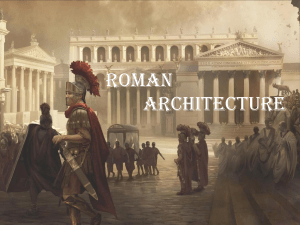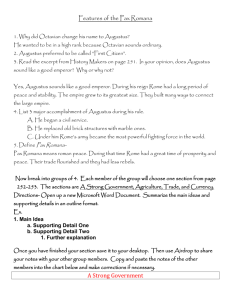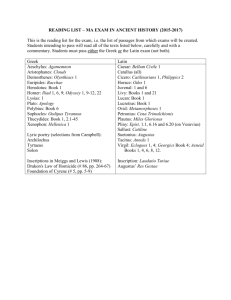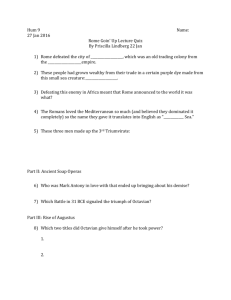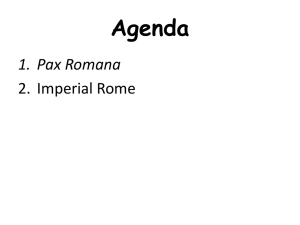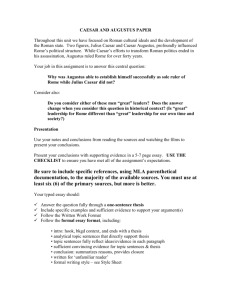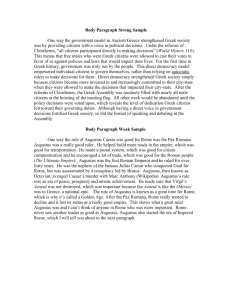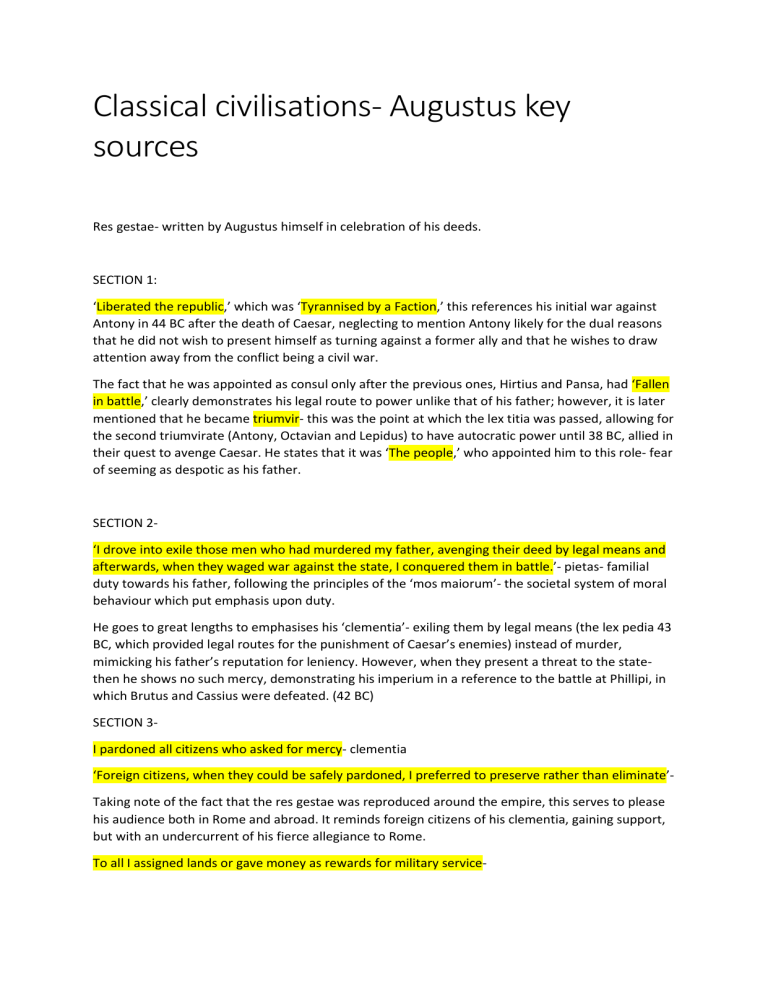
Classical civilisations- Augustus key sources Res gestae- written by Augustus himself in celebration of his deeds. SECTION 1: ‘Liberated the republic,’ which was ‘Tyrannised by a Faction,’ this references his initial war against Antony in 44 BC after the death of Caesar, neglecting to mention Antony likely for the dual reasons that he did not wish to present himself as turning against a former ally and that he wishes to draw attention away from the conflict being a civil war. The fact that he was appointed as consul only after the previous ones, Hirtius and Pansa, had ‘Fallen in battle,’ clearly demonstrates his legal route to power unlike that of his father; however, it is later mentioned that he became triumvir- this was the point at which the lex titia was passed, allowing for the second triumvirate (Antony, Octavian and Lepidus) to have autocratic power until 38 BC, allied in their quest to avenge Caesar. He states that it was ‘The people,’ who appointed him to this role- fear of seeming as despotic as his father. SECTION 2‘I drove into exile those men who had murdered my father, avenging their deed by legal means and afterwards, when they waged war against the state, I conquered them in battle.’- pietas- familial duty towards his father, following the principles of the ‘mos maiorum’- the societal system of moral behaviour which put emphasis upon duty. He goes to great lengths to emphasises his ‘clementia’- exiling them by legal means (the lex pedia 43 BC, which provided legal routes for the punishment of Caesar’s enemies) instead of murder, mimicking his father’s reputation for leniency. However, when they present a threat to the statethen he shows no such mercy, demonstrating his imperium in a reference to the battle at Phillipi, in which Brutus and Cassius were defeated. (42 BC) SECTION 3I pardoned all citizens who asked for mercy- clementia ‘Foreign citizens, when they could be safely pardoned, I preferred to preserve rather than eliminate’Taking note of the fact that the res gestae was reproduced around the empire, this serves to please his audience both in Rome and abroad. It reminds foreign citizens of his clementia, gaining support, but with an undercurrent of his fierce allegiance to Rome. To all I assigned lands or gave money as rewards for military service- Augustus emphasises his popular support, about five hundred thousand cited to have sworn allegiance to him. SECTION 4I was named imperator 21 times There were eight hundred and ninety days on which, by senatorial decree, prayers were offeredshows both Augustus as religious leader and servant of the senate, emphasising his importance to the republic SECTION 5Refused the dictatorship (-paraphrased) – demonstrates that he is not autocratic, he was said to have done this in an incredibly dramatic fashion to push this idea. ‘I freed the whole population from fear and immediate danger, at my own cost and effort,’ – references a time in which Augustus secured a supply of grain during famine, earning great support for the Roman people. SECTION 6References Augustus’ position as a moral leader of Rome, putting into place laws such as the lex Julia/ Poppea. He sresses his wanting to take legal routes to power, asking multiple times for a colleague in his consulship as is customary. Section 7A list of each of the priestly colleges of which he was a part- highlights his position as religious leader. SECTION 8References his handing out of citizenships to those in Roman client states, clearly seeking popularity with those abroad. References his position as religious leader and ‘culture hero’ having handed down many exemplar practices to posterity SECTION 9Emphasises his popularity, referencing the way in which the senate decreed that vows for his health should be taken. References games in fulfilment of these vows- public entertainment was often a way of getting support from the masses. He follows the idea later coined as ‘panem et circenses’- he feeds the populous and entertains them, expecting loyalty in return. SECTION 10References his name included in the salian hymn, being allotted the role of pontifex maximus only after the previous holder of the title died- showing his want to seek power through legal means. SECTION 11Upon his return from campaigns abroad, the altar of fortuna redux was consecrated- ‘fortune returned’- demonstrates Augustus’ position as cultural hero. SECTION 12‘Altar of Augustan peace’- culture hero- bringer of prosperity SECTION 13References the three times in which the gates of the temple of Janus quirinus were closed within his lifetime- this had only happened twice before in the whole of Roman history. SECTION 14Gaius and Lucius named princeps iuventiis, made consuls designate – dynasty SECTION 15Lists donations of money to the plebeians- Augustus clearly sought to copy his father’s tactic of appealing to the plebeians as the largest population in Rome. SECTION 16Also references money paid out- this time to the military. Highlights his generosity SECTION 17Gave 170 million sesterces to a fund for rewards for long serving members of the militarygenerosity SECTION 18Giving of grain and money during a shortage of public funds- cultural hero/pater patriae- brings bunty and safety to Rome. SECTION 19References his building of multiple temples – strength as a religious leader and cultural hero SECTION 20- rebuilding of many public buildings/ structures including three new aqueducts. Als rebuilt eighty temples SECTION 21The building of the forum of Augustus with its temple to Mars Ultor. Augustus’ refusal to accept a golden crown as part of military triumphs- shows his will not to be an autocratic leader. SECTION 22References each of Augustus’ lavish games, entertaining the people of Rome- culture hero/generosity SECTION 23References the mock naval battle put on by Augustus- culture hero/generosity SECTION 24Replaced all of the ornaments in the temples in Asian provinces that had previously been held privately by their rulers. Took down statues of himself around these provinces and from the money raised placed offerings in the temples of Apollo in both his name and those of people conquered. – religious leader, popularity abroad. SECTION 25Saviour of the republic- saved it from pirates (Actually sextus Pompey, but he is not mentioned de to his republican support.) the whole of Italy, along with many of its provinces swearing allegiance to him. More than seven hundred senators fought with him- his immense popularity. SECTION 26Emphasises Augustus’ foreign wars, demonstrating his success as imperator. Emphasises the number of people to whom he gave roman citizenship- clementia, creates the notion that many accepted Roman rule freely. SECTION 27Victory in Egypt at Actium. Instead of taking over seized states in Armenia- handed them over to local people – perhaps creating an image of him as an Alexander the great type figure? Recovered Sicily and Sardinia- important for the securing of grain for the Roman people. SECTION 28References colonies founded by him. SECTION 29Recovered the standards from Parthia- characterised as a war. It wasn’t. deposited the standards in the temple of Mars Ultor- avenger not only of Caesar but the whole of Rome. SECTION 30Tiberius conquered the Pannonians, a feat hitherto unaccomplished- dynasty, not only Augustus bhut his adopted sons as well as impressive imperatores. SECTION 31Kings of kingdoms as far away as India sent embassies to seek the friendship of Rome- imperator, popularity abroad. SECTION 32Foreign kingdoms sent supplicants to Augustus SECTION 33Generosity to Parthia, and other previously inimical states SECTION 34References the first settlement, Augustus’ returning of all autocratic power after the end of all civil wars. Given the cognomen Augustus and had a civic crown and laurel fixed upon his door- imperator, pater patriae. References that he had no more power now than was legal/traditional. Given the clipeis virtuitis given- showing his four ideal traits of clementia, iustitia, pietas and virtus. SECTION 35Given the title of pater patriae. A toast to Actium- Horace. Highlights the greatness of Augustus’ victory at Actium, emphasising the need for celebration. References that this was even greater than the success of Jugurtha against Hannibal, comparing this victory to the prevention of the enslavement of Rome in the Punic war. ‘nunc est bibendum’. This symbolises in part Augustus’ patron Apollo, who ZANKER- HAD THE DUAL ASPECTS OF DISCIPLINE AND MORALITY, PUNISHER OF EXCESS, BUT ALSO THE GOD OF PEACE AND RECONCILIATION, BRINGING IN THE NEW GOLDEN AGE. – galinsky- although Augustus wanted to portray himself as ushering in a new golden age, it cannot be forgotten that the link with the Hesiodic golden age is only in terms of them both being periods of prosperity. The Hesiodic golden age was god given, one of laziness and luxury, Augustus’ was earnt, based upon moral discipline and the stability of Rome Cleopatra- Horace. Highlights the glory of Augustus’ defeat over Cleopatra, marking her at once a vicious threat to Rome, a ‘Deadly monster,’ and a ‘Gentle dove,’ in the face of the ‘Sparrow hawk’ of Octavian. This system of contrasts, marking her a crazed villain, gentle prey then noble in defeat having ‘Showed no sign of womanish fear at the sword,’ clearly creates an image of her as the dangerous foreign queen, plotting doom for Rome, a worthy adversary, yet still one whom Octavian manages to reduce to fleeing prey. Moral decadence- Horace Highlights the moral degradation of Rome, emphasising in contrast Octavian’s position as saviour of the state in instating the lex Julia/Poppea to regulate moral behaviour. Horace states that ‘neglected gods have made many woes for sad Italy’ referencing the civil wars as a result of the near destruction of the temples that were later restored in Augustus’ ambitious scheme of building in Rome. A comparison is drawn between the defeats contemporaneous to the poem and the glorious victories over the Carthaginians, highlighting the higher standard of moral behaviour of Rome’s ancestors which Augustus aimed to emulate. Note- the victory at Actium is described in ‘a toast to Actium’ as even better than those in Carthage, highlighting Augustus’ superiority in both moral behaviour and as imperator. Augustus returns- Horace. Celebrates Augustus’ return after campaigns in Spain, emphasising the safety and stability of Rome under his leadership. ‘I’ll not fear civil war, nor sudden death by violence, whilst Caesar has command of the Earth.’ Emphasises Livia’s exemplar nature, ‘Dressed in holy ribbons,’ for the return of her husband. Drusus and the Claudians- Horace. A prize ode celebrating the victories of Augustus’ grandsons Drusus and Claudius in their 15 BC defeat of the Raetians. Compares their victory both to that of the mythical victories of Hercules and that of the defeat of Hannibal, the victory in the Punic war a common reminder of Rome’s Ancestral glory. Their ancestors (the Neros) were responsible for this defeat. Highlights Augustus’ god qualities ‘By the brave and good are the brave and good created’. A link is also made in this poem to the heroics of Aeneas escaping burning Troy- perhaps creating an image of Augustus as Aeneas, leading Drusus and Claudius to their own great fate as Aeneas did Ascanius. To Augustus- Horace. Describes the return of the standards stolen by Parthia, Roman power now branching ‘From the Sun’s lair in the west to the regions where it rises at Dawn’ culture hero- ‘Caesar, this age has restored rich crops’, references Augustus’ revival of religious custom, describing this to be the source of Roman glory. ‘With Ceasar protecting the state, no civil disturbance will banish the peace, no violence, no anger which forges swords,’-cultural hero/ bringer of peace and prosperity. References Augustus’ quashing of lawlessness, making reference to the Lex Julia as an example of this. References singing of Troy Anchises and the people of Venus, in victory, a nod to Augustus’ divine heritage. Carmen saeculare- HoraceLinks to secular games, the ushering in of a new golden age of prosperity under Augustus. A religious hymn, this refers largely to the more peaceful aspects of the god Apollo- ‘Gentle and peaceful Apollo, lay down your arms,’ praying for fertility for women in accordance with the lex Julia and peace and virtue for young men. References the fates and the destiny of Aeneas, linking it to contemporaneous military victory. Links to Augustus as enforcer of morality ‘Now faith peace honour and ancient modesty dare to return once more,’ War and peace- PropertiusWishes for victory in Parthia, imploring Roman troops to ‘Avenge that disaster of Crassus!’ in their military campaign. References Aeneas- ‘May Venus herself protect your children, let it be eternal; this head that survives from Aeneas’ line!’ Woman’s power- PropertiusHighlights the terrifying nature of Cleopatra, comparing her to mythical figures such as Medea and Penthesilea to highlight her immense threat to Rome. He describes her as ‘A fiery brand burned by the blood of Phillip,’ likening her might perhaps to that of Alexander the great. Her defeat is compared to that of the tyrannical Tarquinius Superbus, describing Rome as ‘Terrified of a woman’s power and fearful of her threats. Her death is likened to that of great threats to Rome from men too, implying that she was no less terrifying because of her womanhood. Propertius references Augustus’ patron god, Apollo Actium, as rejoicing in this battle. Chaste and faithful galla -PropertiusOddly, this poem seems anti – Augustus, imploring that ‘If its permitted, all you greedy ones perish equally and whoever else prefers his weapon to a faithful bride!’, referencing those fighting to return the standards from Parthia. He describes Rome as immoral in its ‘Voluptuousness,’ tempting galla away from her husband but also the resolution of women, staying modest and faithful to the extent that she will ‘Outdo Penelope.’ The temple of Palatine Apollo- Propertiusreferences offerings made at the temple of palatine Apollo after victory at Actium, describing the fat that ‘Rome won through Apollo’s loyalty’. Also references the deification of Caesar, ‘Released by Venus’ herself ‘from his comet,’ references different facets of Apollo- ‘Apollo the victor now demands my lyre and sheds his weapons for the dance of peace,’ Ovid’s metamorphoses- the deification of Julius CaesarDescribes the deification of Caesar, the gods discussing Augustus’ great fate, avenging his father, making ‘Macedonian Phillipi flow twice with blood,’ along with many of his other military exploits. Establishes Augustus’ morality and glorious dynasty. Celebration of AugustusDescribes him as better still than his father, comparing him to many mythical examples of sons exceeding their fathers in glory, including that of Saturn and Jove. Implies that Augustus, like his father, will be deified after his death. SuetoniusMaintains many accounts of Augustus’ great victories, religious duties and revival of customs/morality, earning great public approval; however, is also critical of the emperor. In part 11 of this biography, he is accused of the treachery of engineering Hirtius’ and Pansa’s deaths that he might be made consul, whilst 68 and 69 accuse him of homosexuality, effeminacy and, most shockingly, adultery. He is accused I part 70 of attending the lavish banquet of the gods in the midst of a famine, as well as having proscribed and executed men for the sake of the acquisition of wealth.
